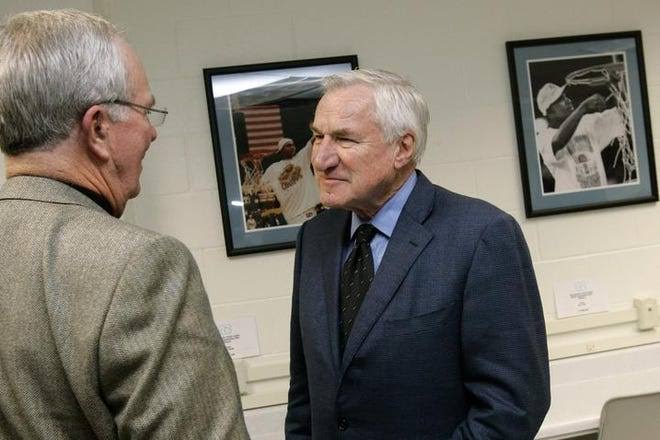On March 30, 1981, the NCAA men’s basketball championship was supposed to be a celebration of the sport. Two iconic coaches, Bob Knight of Indiana and Dean Smith of North Carolina, were set to clash in Philadelphia. Rising stars like Isiah Thomas and James Worthy were primed to take center stage. But instead of being remembered solely for basketball, that night entered history as one of the most surreal and nerve-wracking days in sports — overshadowed by an event that shook the world.
Earlier that afternoon, the nation was jolted by a stunning development: President Ronald Reagan had been shot outside the Washington Hilton by John Hinckley Jr., a mentally disturbed man who carried out the attack in a twisted attempt to impress actress Jodie Foster. Reagan was rushed to George Washington University Hospital after being struck by a bullet that narrowly missed his heart. Three others were also wounded. At 2:27 p.m., the country stood still.
By 3:00 p.m., news of the shooting had reached both locker rooms. Suddenly, the NCAA’s biggest stage didn’t seem so important. Coaches, players, and fans alike wondered: would there even be a championship game tonight?
The hours that followed were tense and uncertain. Between 5 and 6 p.m., NCAA officials huddled, weighing unprecedented options. Among them was the possibility of postponing the game — or even declaring Indiana and North Carolina co-champions. The mood across the nation was somber, and no one knew whether the President would survive.
At 5:30 p.m., word finally came: Reagan had made it through surgery and was stable. Relief spread quickly, and soon after, the NCAA announced that the title game would go forward. The decision was not without controversy. Dean Smith, North Carolina’s legendary head coach, later voiced his frustration, arguing that television contracts had been prioritized over national mourning. “If the President had died, they should not have played,” Smith said, still visibly upset.
Yet play they did. And when the game finally tipped off, the lingering shadow of the crisis gave way to a hard-fought, physical contest. At halftime, the score was razor-thin — Indiana clinging to a 27–26 lead. The tension in the Spectrum wasn’t just from the closeness of the game, but from the knowledge that history was unfolding outside the arena’s walls.
Then came the second half. And with it, the brilliance of Isiah Thomas. Already considered one of the nation’s best guards, Thomas rose to the moment with a performance that defined his career. Orchestrating the offense with a mix of flair and fearlessness, he fueled a 36–24 surge that overwhelmed the Tar Heels. Indiana stormed to the national championship, 63–50, giving Knight his second NCAA title.
North Carolina struggled under the pressure. James Worthy, usually a dominant presence, was held to just seven points. The Tar Heels’ backcourt featured Mike Pepper, a solid player but not the game-changer UNC needed in the clutch. Fate, however, had a twist waiting. The very next season, Pepper’s spot would be filled by a freshman named Michael Jordan, whose arrival would help Dean Smith shed the reputation of being unable to “win the big one.”
But on this night, the spotlight belonged to Thomas and Indiana. Against the backdrop of chaos and crisis, the Hoosiers found focus and fire. They didn’t just win a championship; they became part of a story far larger than sports — a night when basketball nearly stood still, when the health of a president dictated the fate of the Final Four.
Four decades later, the 1981 NCAA Championship remains one of the most unforgettable in history. Not simply because of the result, but because of everything surrounding it. It was a night when tragedy and triumph collided, when the survival of a nation’s leader intersected with the rise of a future NBA legend. And in the middle of it all, Isiah Thomas stood tall, forever etching his name into the fabric of college basketball history.





























